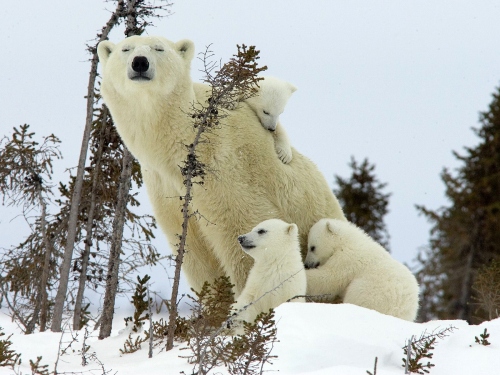 |
| http://polarbearscience.files.wordpress.com |
Children are urged variously to do such things as:
Help save them. Screw up your own life. Turn your back on generations of hard-won effort and industrial progress. Feel bad about just about everything, Just look at what's happening to the polar bears. Turn off lights. Hassle your parents. Be afraid of global warming. Blame humanity for it.
Example here: http://www.thedailybeast.com/newsweek/2007/04/15/will-polar-bears-be-ok.html
'Sean Hussey and his twin sister, Erin, are only 9 years old, but they already know all about global warming. And they're worried, very worried. Teachers at their Hillsborough, Calif., school have shown them pictures of melting glaciers. Sean fears that polar bears will be left homeless. "I like polar bears a lot," he explains. Erin is also concerned about what she calls "the animal side" of climate change. "There are lots of animals that shouldn't die," she says. "The humans are the ones who are causing it." '
Meanwhile, the polar bears are doing OK.
What does that tell you about the scamsters of climate, class? Pretty shoddy? Yup - that's about right.
For a sensible view, one based on reality and not the wishful fantasising of malevolent zealots, here are some observations by Matt Ridley. Extract:
'In other words, the claim that polar bear populations are declining
at all, let alone due to climate change, is a manufactured myth,
designed for media consumption and with very little basis in fact. That
it works all too well is demonstrated by an episode in 2011 involving
Sir David Attenborough. In a television series the brilliant television
presenter, unwisely diverging from neutral natural history, had asserted
that the polar bear is already in trouble. When challenged by Lord
Lawson that ‘the polar bear population has not been falling, but
rising’, Sir David responded. He was quoted by The Daily Telegraph as
saying ‘Most [polar bear populations] are in decline and just one is
increasing – for a number of factors – one being they have stopped
hunting…Lord Lawson is denying what the whole scientific community is
accepting and working at and it is extraordinary thing for him to do’.
Much as I admire and like both men, I have to say that the evidence
suggests that Lord Lawson’s account is closer to the truth. The
International Union for the Conservation of Nature estimated in 1966
that there were 10,000 polar bears in the world; in 2006, the same
source estimated that the population had risen to 20,000-25,000 bears.
Had Sir David examined the text on the PBSG’s website he would have
found that all but one of the eight sub-population declines he cited
were in fact based on ‘beliefs’ or future projections. As demonstrated
by another recent mistake in another television series, this time an
exaggerated claim for temperature change in Africa, Sir David is not
being well served by his BBC researchers these days.
Zac Unger documents in his recent book Never Look a Polar Bear in the Eye,
how polar bear ‘decline’ is now a large and lucrative industry and in
places like Churchill, Manitoba, organisations like Polar Bears
International cynically use the imagined plight of the bears to raise
money, and push propaganda at young people about changing their
lifestyles and those of their parents.'
His writing was inspired by a study made by a polar bear expert Susan Crockford. It is available for download here at the Global Warming Policy Foundation site.
Her study is entitled '10 Good Reasons Not To Worry About Polar Bears'
That would make a good title for a display on the classroom wall would it not? The children would be pleased. Why not help put their troubled minds at rest?
[Hat-tip/inspiration: Booker here: http://www.telegraph.co.uk/earth/environment/globalwarming/9934109/Attenborough-should-check-his-facts-on-polar-bears.html#disqus_thread ]
Note added later on 17 March: The Heartland Institute in the States has produced an advertising-hoarding that could provide ideas for a wall display although it is perhaps too political for the classroom itself::
http://www.facebook.com/photo.php?fbid=10151562704370281&set=a.10150141139700281.328977.140379955280&type=1&theater
And another: More on polar bears and with more links here: http://nofrakkingconsensus.com/2013/03/17/seeing-polar-bears/
Note added 25 Oct 2017. More vindication of the position that polar bears are doing ok: https://polarbearscience.com/2017/10/24/death-of-the-polar-bear-as-climate-change-icon-validates-mitch-taylors-skepticism/
Note added 26 Oct 2018. Yet more vindication:
http://notrickszone.com/2018/10/25/new-papers-polar-bears-continue-to-thrive-grow-in-number-shredding-forecasts-of-climate-doom/
From the inestimable Kenneth Richard:
'Ten years ago, polar bears were classified as an endangered species due to model-based assumptions that said the recession of Arctic sea ice would hamper the bears’ seal-hunting capabilities and ultimately lead to starvation and extinction...
'The paleoclimate evidence, which shows that sea ice was thinner and less extensive than today for most of the last 10,000 years, also contradicts the assumptions about modern polar bear endangerment due to thinning ice. One must ask: How did polar bears survive sea ice free summers in the ancient past if they existentially rely on thick sea ice to hunt prey today?
When the observations don’t agree with the models and assumptions, real scientists are supposed to reconsider their hypotheses.
Climate scientists, on the other hand, too often discard the data that conflict with their modeled assumptions and proceed to call those who question their models and assumptions names (i.e., “deniers”).
This begs the question: Why is climate science so much different than real science?
In the 3 new papers referenced below, extensive observational evidence suggests that polar bear populations are currently healthier than in the past, and their numbers have been stable or growing in recent decades.'
